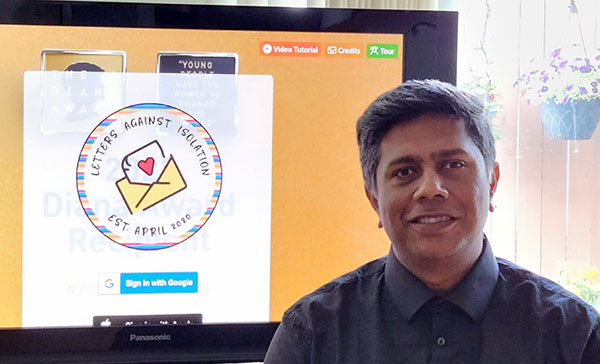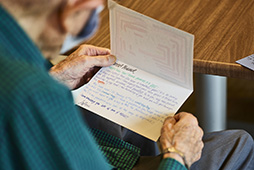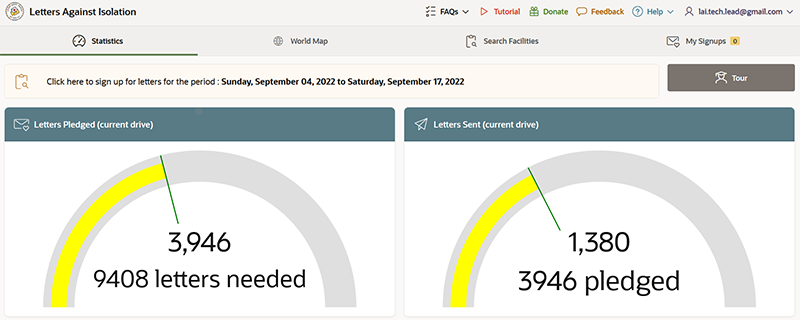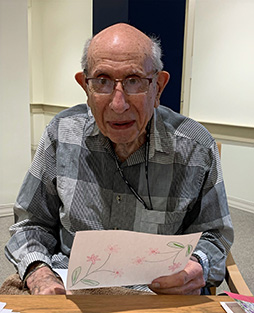
When the pandemic struck in 2020, Shreya Patel worried about her grandmother, who was living in London. Shreya, who now lives in the United States, was concerned that her typically active and social grandmother was struggling with COVID-19 lockdowns.
“Watching her isolated at home and unable to see her friends and her community was difficult,” says Shreya, who is currently a college student at Washington University studying business, computer science, and philosophy. “Even though my sister, Saffron, and I were calling her and texting her every day, those feelings of loneliness still get to you. We were trying to figure out what to do to make her feel a bit more loved, a bit more special.”
Then Shreya’s grandmother received a hand-written letter from a friend.

Shreya and her sister Saffron saw that letter change their grandmother’s demeanor. “We realized there was something magical about receiving a handwritten letter,” she says. “It’s a tangible reminder that someone’s thinking of you and cares enough to have written something for you. And we thought, we need more of that, especially for senior citizens isolated by the pandemic.”
Studies on senior isolation show people who are lonely tend to have poorer health outcomes and higher morbidity rates when compared to their non-lonely peers. So in 2020, the two sisters founded Letters Against Isolation, a nonprofit with a mission to connect elderly care facilities with volunteers willing to compose hand-written letters to seniors.
“The pandemic made it tough for activities directors in senior centers all over the country to help seniors feel less lonely at a time when it was difficult to connect with people in person and in a population that isn’t always comfortable with technology,” says Shreya. “We believed that we could do something to help this situation.”
Scaling a good idea
The sisters began reaching out to senior care facilities to ask if their residents might be interested in receiving handwritten letters. The response was overwhelmingly positive. With a growing demand for letters and interest from volunteers to help write them, Shreya used a shared online Google spreadsheet to coordinate it all. However, she realized a spreadsheet couldn’t scale to handle the increasing volunteers and participating facilities. The spreadsheet also didn’t provide a good user experience, didn’t work well on mobile devices, was limited when it came to performing things like data reporting and analysis, and was not resilient against user errors.
“Volunteers would inadvertently make changes to the Google sheet—columns would get deleted, people would overwrite each other’s signups,” she says. “I spent hours each week maintaining the sheet and making sure it was functional. Those were hours I could have spent building the nonprofit.”

In 2021, Shreya was recognized by a consulting company for her work at Letters Against Isolation and was invited to participate in its student leadership program. As part of that program, she was paired with Satish Prasad, a performance architect with a strong background in architecting and developing complex, data-driven applications.
Impressed by Letters Against Isolation’s goals, Satish immediately began working with Shreya to tackle the nonprofit’s technical challenges and take the organization to the next level. They decided to build an online platform to replace the signup spreadsheet, allowing them to easily manage the growing number of senior care facilities, their letter-writing needs in different languages, and pledges from an expanding volunteer base.
To do so, they needed a database that could scale as the nonprofit grew. They also wanted a simple, clean user interface that would allow them to keep the volunteer sign-up process fast and easy and that would work on a mobile phone. Satish looked to Oracle for a solution based on its strong database capabilities. Around the same time, Oracle launched Oracle APEX Application Development Service.
“I like the fact that Oracle APEX is a mature programming platform that’s been around almost 20 years, and that Oracle was making investments and hosting it as a first-class platform as a service where everything would be managed in Oracle Cloud Infrastructure (OCI),” says Satish . “That convinced us this would help a volunteer organization like ours, with very limited time, focus only on the application behavior. All the other database management, infrastructure management, patching, and backups would be done automatically on OCI.”
Building the framework
With over 25 years of software architecture and development experience, Satish had never worked with Oracle APEX. Through extensive use of tutorials, online documentation, YouTube videos, and community help, he was able to figure it all out, while Shreya provided critical input into functional requirements and site design.

Soon, the two developed a scalable, responsive Oracle APEX application that supports the large group of 30,000-plus volunteers who send more than 10,000 letters to isolated seniors every 2 weeks in 5 countries around the world.
The Letters Against Isolation Volunteer Pledge Portal app was deployed in 2022. The app currently runs Oracle Autonomous Database with Oracle APEX version 22.1. The app also allows volunteers to authenticate using popular OAuth platforms like Google, Facebook, Apple, and Microsoft. They can search facilities using various filters, render dynamic maps of countries and states with open letter demand, pledge letters to write using simple forms and dialogs, manage their pledges, update letters sent, and track statistics of the current pledge drive using rich data visualization widgets.
Administratively, the app lets Letters Against Isolation volunteer leads manage facility master data along with language needs, manage pledge drives, and view detailed charts and reports, including performance dashboards and activity dashboards.
“APEX made it easier to start developing charts and graphs and other detailed drill-down reports on Oracle Database,” says Satish. “We also were looking for a better way to authenticate and authorize our users—who they are and what they can do. Those are two very important features we use heavily in the Oracle APEX framework.”
Satish had built many web applications from scratch and knew the headaches associated with building out all the common cross-cutting concerns. APEX includes pretested, pre-validated, community-approved framework features—list of values, page computations, and process blocks. “All of those were huge impacts in accelerating our development and reducing bugs,” he says.

Satish was impressed by how easy it was to provision free APEX instances on OCI to prototype and test the application. Once it was ready, it was seamless to export the application code to a scaled, paid APEX instance on OCI. He also used OCI’s ability to quickly clone an APEX instance to test and troubleshoot versions of the application.
Currently, Letters Against Isolation has more than 30,000 registered volunteers from more than 15 countries. Since its inception, the organization expanded to serve thousands of seniors in the US, UK, Canada, Australia, and Israel, and sent almost half a million handwritten letters to date.
After the app launched, it received overwhelmingly positive feedback for its ease of use, rich theming and styling, and responsive layouts on all devices. “APEX Universal Theme is a game changer in low code development. I don’t have to worry about a consistent look and feel across pages and components,” says Satish.

“Our volunteers have found the web platform built using Oracle APEX so intuitive and easy to use. We’ve seen everyone from teenagers to an 80-year-old get this lightning-fast. They really love to use it to manage their letter-writing pledges.” –Shreya Patel
“Most of our volunteers are seniors too, and are not very tech-savvy,” adds Shreya. “It was amazing to see how the excellent UI builder in APEX made it so simple to create menus, filters, and cards that anyone can figure out. We have taught an 80-year-old to use the platform and she loves it.”
With the technology well in hand, the nonprofit is working to expand its impact in several ways. For example, the organization ensures that anyone who wants to write can afford to send postal mail regardless of financial ability. So far, the group has raised enough money to launch the Anne Granville Stamp Fund for both student and senior volunteers in the US and Canada to subsidize postage costs.
The team is also working to expand and retain volunteers. That effort includes using social media to motivate people across the globe to get their friends, families, workplaces, and communities involved.
The group has also participated in many community events such as supporting firefighters when forest fires were ravaging the West. “The power of a handwritten letter doesn’t apply to just seniors. It can apply to anyone going through a difficult situation,” says Shreya.
And the results have paid off. Shreya was awarded the prestigious Diana Award, which honors young people who work to improve the lives of others.